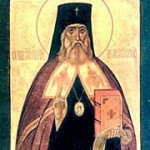Among the prominent Russian missionaries, St. Nicholas Kasatkin (1836-1912) was the tireless evangelist to Japan during that nation’s dramatic transition from feudal isolation to its emergence as a Westernized and modern society. In the mid-19th century, no traces of the 16th century Spanish and Portuguese missionary efforts remained in Japan after 250 years of persecution and xenophobia of the Tokugawa shoguns.
The son of a deacon, John Kasatkin was an outstanding seminarian in his native Smolensk; he won a scholarship to attend the St. Petersburg Theological Academy, where he graduated with honors in 1860. After reading accounts of his countrymen’s travels in Japan, John first considered missionary work in that far-off country; a request for a chaplain by the Russian consulate in Hakodate, in northern Japan, furthered his commitment. Although the Academy’s staff desired that he remain in St. Petersburg as a professor and research scholar, John won them over with his zeal and was ordained to the priesthood, and was named “Nicholas.”
Travel across Siberia delayed Fr. Nicholas’ voyage to Japan, a fortuitous event, for he met another famous Russian Orthodox missionary – Bishop Innocent Veniaminov (1797-1878). The missionary bishop, later to be known as the “Apostle to America”, shared his insights from nearly forty years of experience in the Far East and Alaska. He emphasized that the Bible and the Liturgy should be translated as soon as possible, and the importance of being familiar with the native culture. Bishop Innocent even gave Fr. Nicholas a new cassock, indicating that the Japanese would not believe that God is All-Mighty if the evangelist appeared like a beggar. Arriving in the spring of 1861, Fr. Nicholas was initially overwhelmed (as Bishop Innocent had warned) with the strange customs and difficulty of the Japanese language. In another fortuitous occurrence, Bishop innocent stopped over for several weeks in japan, and observing Fr. Nicholas engrossed in the consulate library, encouraged him to “…put away the books in French and German and learn the language of the Japanese…” For nearly seven years, Fr. Nicholas not only mastered the language, but also studied Japanese history and culture to gain insights into the Japanese mindset.
Although evangelism was forbidden by law, Fr. Nicholas gained his first convert in a rather unconventional manner. Confronted by a xenophobic and anti-Christian samurai, Fr. Nicholas invited him to hear the Gospel for himself before condemning it. The samurai returned day after day to take notes, often stopping to question and argue points, while Fr. Nicholas patiently explained the Holy Scriptures. Over time, the samurai began, at the risk of his own life, to share with two others the truth of the Gospel; in 1868, the trio sought baptism. Despite sporadic persecution from 1872 until 1873 (when the government lifted the proscription against Christianity), the Orthodox Church in Japan grew rapidly after that, due to Fr. Nicholas’ emphasis upon establishing a native church. The faith was spread by indigenous lay evangelists, rather than foreign missionaries, to numerous cities and regions of the country and even beyond.
Fr. Nicholas and assistants concentrated early on in translating the Bible, the textual quality of which would be praised by even non-Orthodox missionaries. Liturgical texts, hymns, and other religious materials were also diligently translated to provide for services in the native language. Native leadership was established with ordination of native clergy, and training of seminarians, native choir directors, lay readers, iconographers, etc. In recognition of the growth of the church in japan, the Holy Synod of Moscow elevated Nicholas to the episcopate in 1880. To blunt criticism and even outright persecution of the Church during the Russo-Japanese War, Bishop Nicholas issued an encyclical instructing the Japanese faithful to support the Japanese war effort, and provided clergy to tend to the spiritual needs of Russian prisoners of war. By 1911, the Japanese Church numbered over 30,000 faithful in over 250 communities. After over 50 years of missionary labor in Japan, Bishop Nicholas fell asleep in the Lord on February 16, 1912. For his zealous missionary labors, Bishop Nicholas was canonized in 1970 by the Russian Orthodox Church as “Equal to the Apostles” and the “Enlightener of Japan.”
